Can dreams come true? Reader Q&A: The difference between memoir and memoirs
| OCTOBER NEWSLETTER | Writing Prompts, News From Ubud & Reader Q&A
Dear reader,
I managed to squeeze the October newsletter in on the last day of another busy month, Halloween no less…the night when the souls of the dead are said to return home and the boundary between the worlds of the living and the dead becomes blurred.
Growing up in Germany, I can’t remember ever trick/treating on Halloween, but I’m always intrigued by the idea of boundaries between worlds becoming blurred. Last week the boundaries of my world became blurred in the best possible way when I returned to Ubud in the hills of Bali—where I lived for a while in 1986, a clueless, curious backpacker—to launch my book!
It was my first time at the Ubud Readers and Writers Festival, now in its 21st edition, and it exceeded my expectations. The closing ceremony in the expansive gardens of the Blanco Renaissance Museum was something out of Hollywood; the keynote speakers were high-calibre, including Nobel-prize winning journalist Maria Ressa, Amitva Gosh, William Darymple; the food was delicious, the conversations stimulating, and the atmosphere exciting and relaxed despite the unbearable heat. Unfortunately I missed the opening ceremony as I had an important date with SBS television (more about that soon).
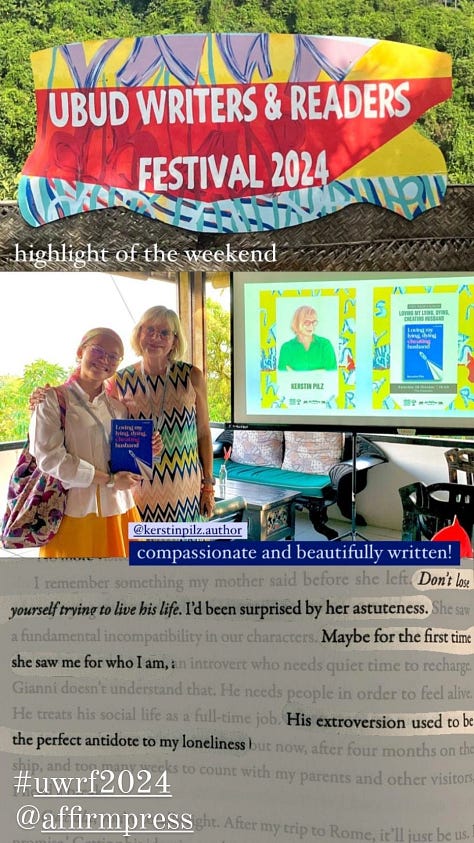
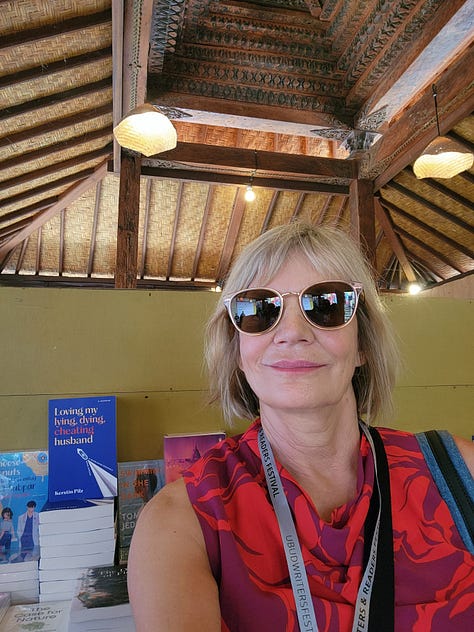
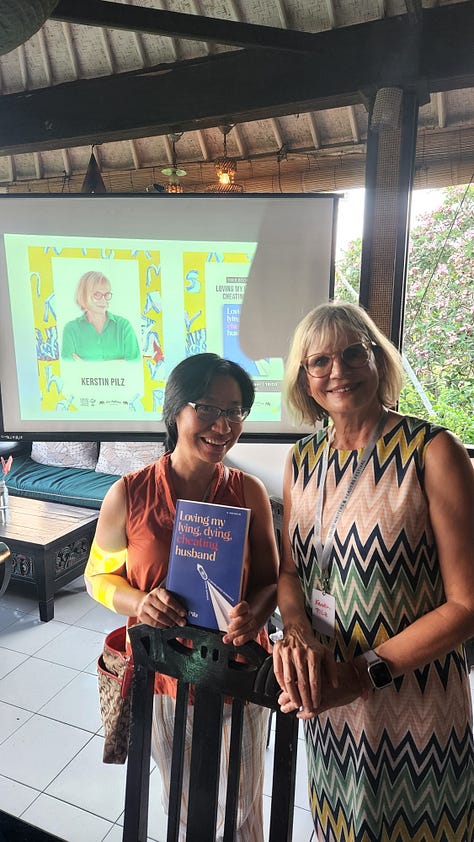
I’d been worried that nobody would come to my book launch given that I don’t know anybody, but I needn’t have worried, I had a full house! People, mostly women, of all backgrounds and ages came and asked interesting questions. Lots of Australians, some who’d read my book or heard my interview with Sarah Kanowski on ABC Conversations, and many young Indonesian women who asked great questions and posted lovely things about me on Instagram.
It made me realise that my title, Loving My Lying, Dying, Cheating Husband, does a lot of the heavy lifting. Everybody I met at the festival told me that they’d noticed the title and been intrigued.
Going to writers festivals is like soaking in a bubble bath of ideas and inspiration. As a guest of the festival you have access to the greenroom, which is the most exciting part. My highlights included chatting with Australian superstar author Nam Le (who is refreshingly humble); being recognised and approached by award-winning author Siang Lu (who after several award-winning books still feels like an imposter); sitting within touching distance of Amitav Gosh (I didn’t ask for a selfie, but hopefully some of his storytelling magic rubbed off); being complemented on my second-hand dress by an international agent (who was excited about my book and wondered why it hadn’t been picked up for international distribution).
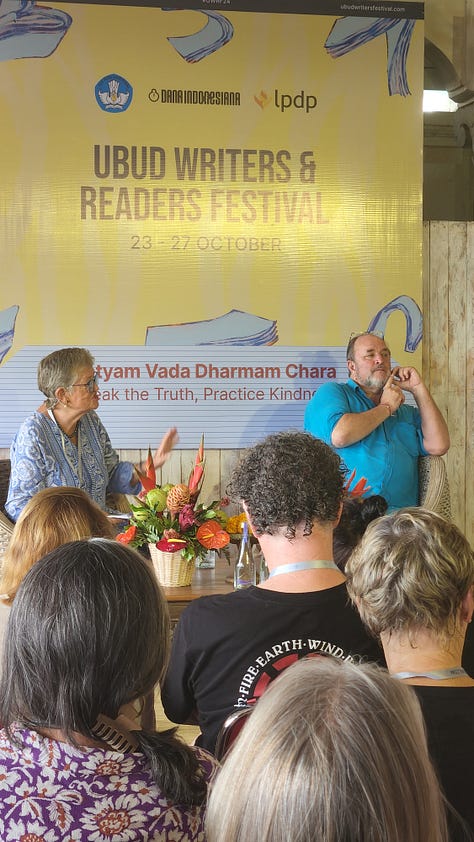
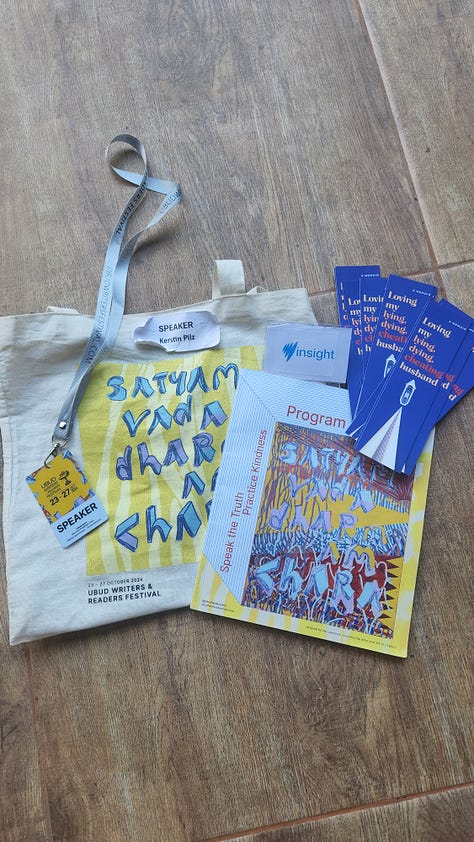
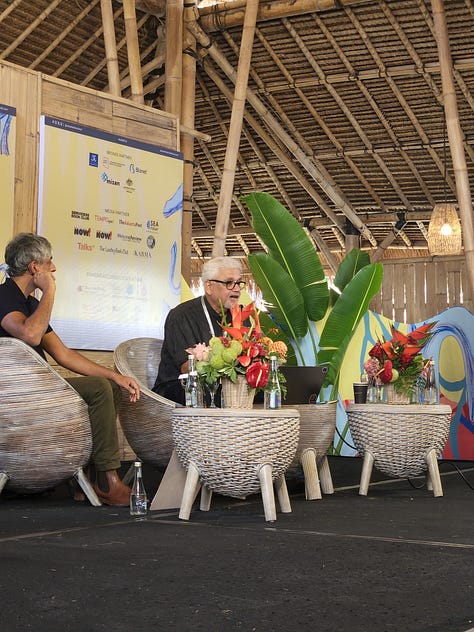
I also chatted with many lovely volunteers who made sure we always had plenty of food and drink, and to media people, including Jill, a cool, seventy-something Bali-based expat who has led a most interesting life photographing people all over Asia.
‘I could write a book about my life,” she said, scrolling through her phone to show me photos from her latest trip to Rajasthan.
‘But writing memoir is such self-indulgent navel-gazing nonsense, don’t you think?’ She looked up from her phone and noticed my raised eyebrows. Oops.
I kept my cool slipping her a bookmark with the details of my memoir, before I launched into my well-rehearsed, unsolicited mini lecture on memoir. Later that day, she came to my book launch, cheered me on and thanked me for learning something new. Who knows, maybe she’ll write a book about her interesting life one day?
The point is, memoir doesn’t have to be self-indulgent navel gazing. Many people confuse ‘memoir’ with ‘memoirs’ or ‘autobiography’. I am passionate about this distinction, and will subject anybody who is vague on it to my impromptu lectures. In fact, I’ve included one further down in the ‘Your Writing Questions Answered’ section, where I explain the difference between memoir and memoirs and how to write about your life.
But first, here are your monthly writing prompts. Coming to Bali to launch my book, felt a bit like a dream come true. I’d always wanted to be a writer, and I’d always wanted to attend a writers festival as a writer, at least once, or twice in my life. It only took me a few decades…but I never lost sight of my dream.
What are your dreams? Let’s find out…
“Yes: I am a dreamer. For a dreamer is one who can only find his way by moonlight, and his punishment is that he sees the dawn before the rest of the world.”
Oscar Wilde
Are you a dreamer? What are you dreaming of? What will it take to find your way to fulfilling your dream? Moonlight? Discipline? Different living circumstances? What is the reward for following your dreams? And what do you have to sacrifice to do so?
“There is only one thing that makes a dream impossible to achieve: the fear of failure.”
― Paulo Coelho, The Alchemist
Write about your fear of failure and what holds you back from following your dreams.
“Some women choose to follow men, and some women choose to follow their dreams. If you're wondering which way to go, remember that your career will never wake up and tell you that it doesn't love you anymore.”
― Lady Gaga
Not sure that I love Lady Gaga, but I love this quote. In my forties I woke up one day and realised that I was married to a job that didn’t love me back. It wasn’t that my career had fallen out of love with me. I had fallen out of love with it, because it hadn’t ever really been a passionate love affair.
I love my new career as a writer—even if there is zero job security and the pay is shit. Unlike Siang Lu, I don’t feel like an imposter. At my age I can’t afford to indulge the imposter. I may not be famous, but I’ve worked hard and I’ve earned my place, drinking coffee, eating chocolate brownies alongside writers of all levels of fame in the greenroom. Nobody in that greenroom was born an award-winning author. Some just got there faster, and reached higher, than others.
What about you? Are you following your dreams? Or your duty? Or somebody else’s dreams?
“It does not do to dwell on dreams and forget to live.”
― J.K. Rowling, Harry Potter
What is one thing you can do this year (remember, there are only two months left!) to make sure you live your dreams and don’t dwell on your dreams, whilst forgetting to live?
Set a timer for each prompt, 7-10 minutes is good, and just write. Don’t think or edit, simply let it flow. Don’t allow the inner critic to have a say. Write like the wind, curious about what you might discover.
If it helps, use this meditation to get into the flow.
And please share in the comments what comes up for you! I love creating dialogue with my readers and fostering conversation between readers and writers. So please leave a comment (or tick a ‘heart’ to acknowledge the work that goes into these free newsletters).
Reader Questions
Unsurprisingly for an author of memoir, I keep getting a lot of questions about how to write about your life. Surprisingly, there’s a lot of confusion about the genre of memoir.
This month’s reader question is an opportunity to clarify that writing a ‘memoir’ is not the same as writing your ‘memoirs’.
Here’s the original reader question:
I am writing my memoirs but as a person who grew up in the internally displaced persons' camps and subsequently refugee camp, the memoirs are stretching to over 20 years of my life. The series of memoirs make my book look like autobiography. However, I need to write memoirs. How do I ensure that my book is published as memoirs?
In my head I immediately edited the question down to this:
I’ve had an eventful and challenging life, growing up in displaced person’s and refugee camps. I want to write about memories stretching over 20 years of my life, which would make it an autobiography. How do I ensure that my book is published as a memoir?
Writing this down, I realised I’d falsified the meaning of the original question. The reader hadn’t used the word ‘memoir’ but ‘memoirs’ which is in fact a form of autobiography. It’s a common confusion that has always bugged me.
While I was writing my memoir, people would often ask why it was taking me so long to write my memoirs (as if writing a memoir was simply matter of jotting things down in chronological order).
Others would tell me that their own memoirs would be terribly boring to read (which was another way of saying, how could my memoir be any different, given that none of us are famous and thus worthy reading about).
When non-writer friends would introduce me as a person writing her memoirs, I could feel people inwardly roll their eyes at my perceived self-indulgence. So what’s the difference difference between ‘memoir’ and ‘memoirs’?
The difference between writing your ‘memoirs’ and writing your ‘memoir’
A memoir is told as a story. It’s a dramatised version of a transformative life event that has a universal, generally uplifting, meaning. In other words, a memoir is not a written record of a person’s entire life story, but a story confined to a certain period in the writer’s life (five years in my case). An engaging memoir, whilst based on true facts, uses the same narrative devices as fiction in order to keep the reader turning the pages.
While a memoir is a story from someone’s life addressing a particular theme (ie. overcoming addiction; growing up gay in a conservative small town; getting through heartbreak etc), memoirs by contrast, are a written record of someone’s life. Much like an autobiography, memoirs are a collection of life events, hence the plural as opposed to the singular memoir. Usually memoirs are written in chronological order without a defined story arc.
Let’s go back to this month’s reader question, How do I ensure that my book is published as memoirs? First of all, you’ll need to clarify if you want to write a memoir or your memoirs. Both are hard to sell to a publisher when you’re not famous. But a well-crafted memoir that follows the storytelling conventions of compelling fiction has a much better chance of being picked up by a publisher.
“The difference between memoir and autobiography, as far as I see it, is that a memoir is there primarily to tell one particular story, whereas an autobiography tries to be a full account of a life.”
Salman Rushdie
When writing my memoir Loving My Lying Dying Cheating Husband, I was told not to get my hopes up because selling a memoir when you’re an unknown first-time author is exceedingly hard. Selling your autobiography, or your memoirs, when you’re unknown, will be almost impossible, which is why many people resort to self-publishing. I considered self-publishing, but a friend who’d worked in publishing was adamant that I needed to pitch it to a traditional publisher first because, in his words, I’d crafted a page-turner.
That I was able to sell my memoir to the first publisher I pitched, Affirm Press, was obviously very lucky. But it was also the result of years of hard work finding and honing my voice across different genres—from academic, travel, feature and copy writing to blogging—and learning the conventions of creative narrative non-fiction.
I used the classic three act structure to write a plot-driven narrative that had a story arc. This meant I needed to start with a strong hook, have a well-defined premise and, in order to create narrative drive, include only scenes that were relevant to the story, building to a pivotal moment—which meant sacrificing a lot of good material I’d spent days, even weeks, polishing.
Mind you, this is not the only way to write a memoir. There is also the essay-style memoir, which is harder to sell to a publisher. The writing has to be exceptional and it helps if the author already has a big platform. Examples include Australian journalist and author Julia Baird’s most recent books Phosphorescence and Shining Bright. Written as a the result of the author’s real life battle with cancer, these books are meditations, or philosophical explorations of the universal themes addressed by each book—joy & awe, grace&forgiveness—with autobiographical anecdotes woven through.
How do you craft a memoir from events that span over twenty years in the author’s life?
Let’s go back to the original reader question. How do you shape messy life events that take place over the span of many years into a compelling read? Start with your premise. What is your story really about? The hardship of living as a displaced person? The resilience that came from growing up in a refugee camp? Overcoming the odds and living a full life despite difficult beginnings?
I struggled with premise for a long time, yet it was so simple. My publisher came up with what’s called a high concept title that sums up my uniquely relatable premise: how to love my lying, dying, cheating husband (or, how to grow from heartbreak, not be crushed by it).
“A memoir forces me to stop and remember carefully. It is an exercise in truth. In a memoir, I look at myself, my life, and the people I love the most in the mirror of the blank screen. In a memoir, feelings are more important than facts, and to write honestly, I have to confront my demons.”
Isabel Allende
Consider your story arc. What are the turning points in your story? What is the central moment? Which events need to be included to lead up to the pivotal moment, or the climax of the story? What is at stake in your story? What obstacles need to be overcome?
Identify the central conflict, then write scenes from your life that lead up to that moment of conflict. What is your overall theme? Consider who will read your book and why. Most importantly, ask yourself why are you writing this book? To get a central message across or to create a record of a complex life that started in a refugee camp?
Need help mastering the craft of writing?
If all of this is new to you, as it was for me, consider taking a creative writing class. Or join us on a writing retreat. Edwina and I teach you all the basics over the course of a week in a beautiful location with glorious food. Enjoy the company of other writers, and help each other learn and grow. Heavenly Hoi An is now on sale. Sign up now, receive 15% off and start the new year by learning how to craft a bestselling story!
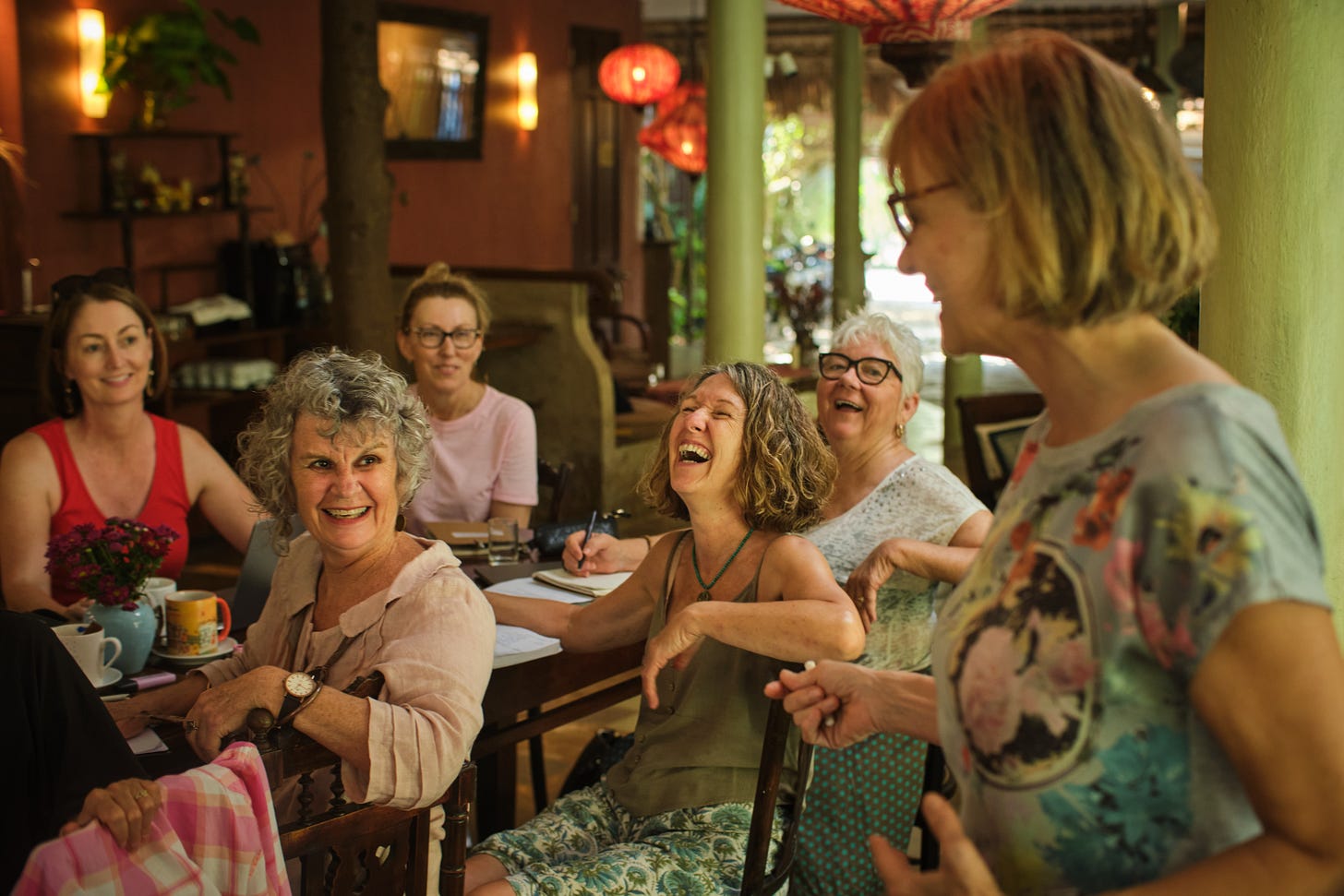
If Tuscany is calling you, here’s something to sweeten the deal: hook up with a friend, book a double room together and receive a whooping 20% off! (only applies to the double rooms in our Italy retreat).

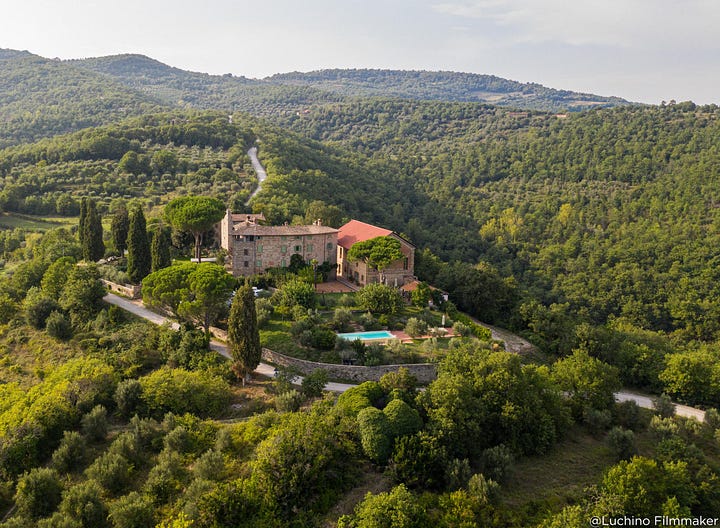
That’s it from me for this month. I look forward to a calmer November, a month to gather my thoughts, tie up loose ends, tidy my messy office and get ready for a new year of writing. I’m also planning to hold an end-of-year writing workshop (most likely with Edwina) so that we can all tidy up some loose ends, set new writing goals and come together as a supportive writing community on Zoom once more.
Stay tuned for my November newsletter for more details. Since I am not planning to do any far-flung travel this month, I’ll be sending the next newsletter out well ahead of the end of the month.
Wishing you a great November and hope to see you on Zoom before the end of the year!
And please keep your reader questions coming.
With many blessings,
PS: follow my journey on Instagram @kerstinpilz.author.


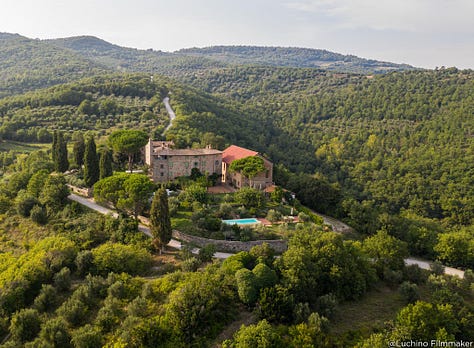
Heavenly Hoi An (February 10 - 16, 2025) Now ON SALE! 15% OFF
Blissful Bali (June 23 - 29, 2025)
Incredible Italy (10-17 October, 2025) Book a double room with a friend and get 20% off (each).











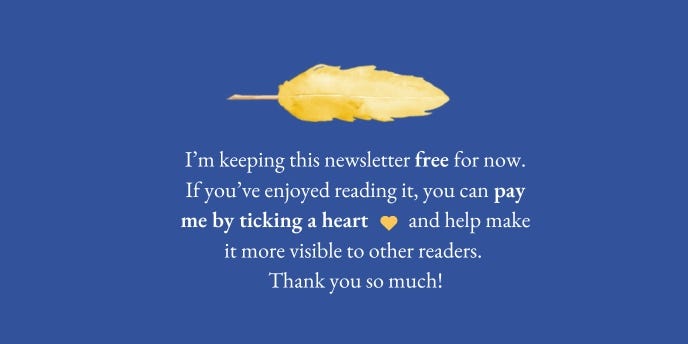
Recently somebody at my U3A (University of Third Age) memoir Writing group asked me: what’s the difference between memoir and memoirs? So coming across your October newsletter today and finding exactly that question being answered is a great find. It was a very good and enlightening read and I will pass it around, if you don’t mind.
Thank you Kerstin, I enjoyed your newsletter and have used the writing prompts. Great inspiration!